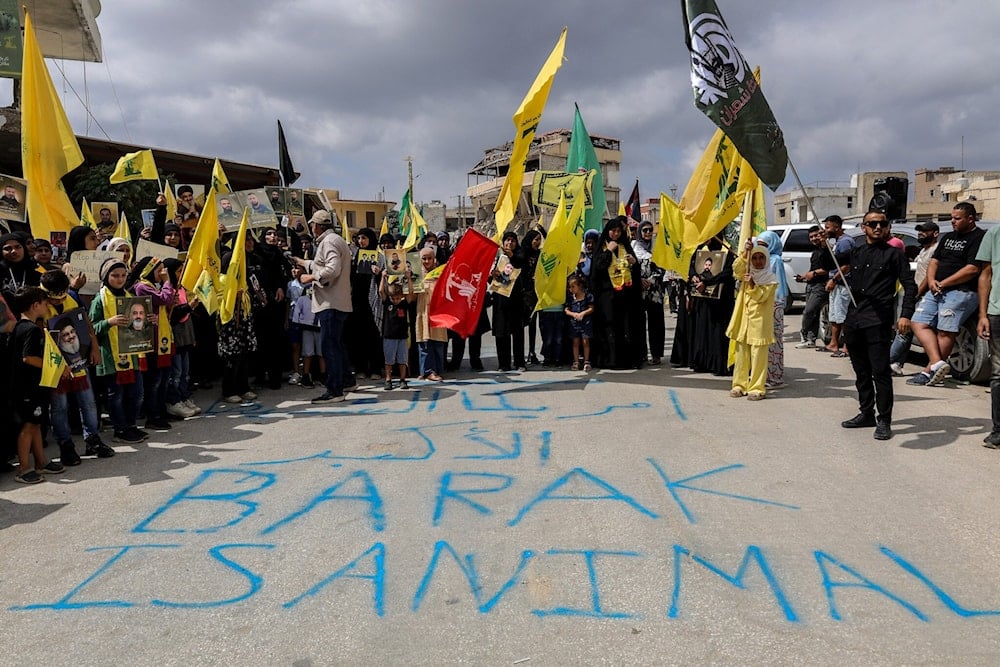Carnegie: US push for military approach to Hezbollah arms worst option
A Carnegie commentary by Michael Young argues that the US attempt to push for Hezbollah's disarmament in Lebanon has collapsed, exposing Washington's lack of leverage and the dangers of a military approach.
-

Protesters hold up Hezbollah flags behind graffiti reading 'Barak is animal,' as they demonstrate against the planned visit of US envoy Tom Barrack to south Lebanon, after he had called Lebanese reporters 'animalistic', on August 27, 2025, in Khiam, South Lebanon. (Rabih DAHER / AFP)
A commentary published by writer Michael Young for the Carnegie Endowment described the recent visit of US officials to Beirut as a diplomatic debacle that exposed Washington's lack of leverage in Lebanon.
The trip brought together envoy Tom Barrack, former envoy Morgan Ortagus, Senators Lindsey Graham and Jeanne Shaheen, and Representative Joe Wilson. Rather than advancing dialogue, the delegation provoked controversy. Barrack called the Lebanese press "animalistic," sparking outrage, while Graham warned bluntly, "Don't ask me any questions about what Israel is going to do until you disarm Hezbollah."
Failed Mission
According to Young, Barrack had returned from "Israel" without the concessions he had hoped for. Israeli leaders reportedly refused to scale back attacks or withdraw from occupied territory in the south, leaving his disarmament plan void of reciprocity. The Lebanese government has since dismissed the proposal and its end-of-year timetable as unworkable.
The episode also raised doubts about Barrack's position. With little backing from the administration, Young suggested he may soon step aside, while Ortagus, who returned to Beirut alongside US Central Command's new head, is likely to take on a more prominent role in security discussions.
Dangerous Shift
Graham's remarks hinted at a deeper shift in Washington. "If we cannot reach a peaceful disarmament solution for Hezbollah, then we need to look at plan B. Plan B is disarming Hezbollah by military force," he said, signaling US willingness to consider a military path.
Lebanon's army leadership, however, has warned of the dangers, as Army Commander Rudolph recently threatened to resign rather than take such a step. His closeness to President Joseph Aoun suggests the two do not see matters very differently, especially when taking into account past attempts to disarm factions, like earlier attempts in the 1980s, and the prolonged battle in the Nahr al-Bared Palestinian refugee camp. Young noted that the military is unlikely to survive a confrontation intact, and that Hezbollah would rally widespread Shia backing if force were used.
Read more: 'Israel' announces readiness to support Hezbollah disarmament plan
Political Suicide
Think tanks in Washington have echoed Graham's approach. David Schenker of the Washington Institute argued the US should keep pressure on by conditioning aid and reconstruction on Hezbollah's disarmament, but Young countered that such pressure risks sparking civil war rather than strengthening Lebanese sovereignty.
He concluded that Lebanon faces "political suicide" if it bows to calls for an internal armed conflict with Hezbollah. The US, he wrote, has repeatedly abandoned allies once wars become inconclusive, and "there is absolutely no reason for the Lebanese to destroy themselves in order to purportedly save themselves."

 3 Min Read
3 Min Read








